I don’t understand
Summers in Milan are extremely hot. Since I don’t have air-conditioning in my flat, finding ways to think clearly pushes me outside, as far away as possible from concrete. The park always seems like a good compromise, so I go sit on one of those picnic tables with my books out and my notepad, fighting mosquitos and sweat and trying to understand how to approach this text. I’m finding it hard to concentrate on my readings and notes but of course while I am able to, some bearded man comes to ask if he can sit at “my” table. I nod, even though I would prefer being alone. The man is homeless or at least seems to be, gathering from his clothing. My assumption leads me to all sorts of inherently discriminatory and intrusive thoughts: ‘Is this man going to touch me?’ ’Is he going to steal my phone? Shall I just put it in my bag or is that going to show that I’m a bit worried?’ ‘Why am I so suspicious? This man’s just eating a sandwich’. As I pretend to read a book, I realize the man has been talking for the entire time. Naively, I turn to him. He must be talking to me.
The guy’s gesticulating, staring right into the void, making shapes with his hands and talking what seems gibberish to me. Intrusive thoughts knock again: ‘He’s just crazy or drunk or on something and god he smells awful…’ and once more, fighting with myself, I calmly reply to the voice in my head that ‘No, he might be speaking another language’. So I gather all my courage and ask in Italian ‘Che lingua parli?’ (What language do you speak?) He turns to me and says: ‘Hungarian!’ and then starts giving me some numbers and percentages and mentioning Chicago and Hollywood and Roma and Hitler and for sometime, we are exchanging words in two separate languages. I interpret gestures and words and try to make sense. I’m putting languages together, constructing a puzzled narrative and looking to find a common ground, something to hold on to, acceptance or mutuality, something that doesn’t leave me stranded here.
The guy looks and laughs at me. He’s shaking his head, turning his finger around his right temple as if to signal ‘You’re crazy.’ ‘Ah, sarei io la pazza!’ (Ah so I’m the crazy one now!). He’s not entirely wrong but that’s when I take my phone out, it kind of feels like a weapon. Here’s reason coming to solve this stupid riddle. Quickly I search on Google translate:
‘Come ti chiami?’ -> ‘Mi a neved?’ -> ‘What’s your name?’
Everything crumbles now, like the Southern Oracle in the Neverending Story as they utter: “we don’t know how much longer we can withstand the Nothing”. I begin to realize I’ve broken something and have allowed sense to conquer, once again, human interaction. Shortly after, the man leaves to play chess with another man at a nearby table. They play without saying a word.
We’ve just lived a perfect example of poetic language, I write in my notes, if it’s to be understood as Kristeva suggests, as a realm to transgress a territory, questioning linguistic structures and ‘imitating the positing of meaning.’[1] The man in the park and his gibberish, were poetic acts of resistance towards language as carrier of sense and my translation was coming from my privileged position as native speaker of the land we inhabited at that moment in which I needed to understand while he was free to explore. It raised urgent questions related to agency, who’s the listener and who’s the speaker and how can this interaction play a role in making and unmaking of sense, of language/s, speech, utterances? Can words subside meaning? Can poetic language and text exist and generate beyond conscious acts of writing or performing?
Some of these questions and my strange encounter, brought me back to Anna Barham’s reading encounters TO BE WE TO BE, conceived for Quote—Unquote, an interdisciplinary platform devised and curated by Infinite Conversation. During each of the four sessions, a closed number of participants was asked to take part in a collective online reading of Gertude Stein’s text Patriarchal Poetry, facilitated by Anna and deciphered by voice-recognition software. During the first meeting I took part in, Anna asked us to turn our cameras off and read a section of Stein’s text in unison, trying to keep up with each other. The result was a tangle, of voices, mingling, overtaking and sinking one another and into one and the other. Reading in unison on Zoom seemed impossible but there was a very strong sense of a shared experience. The feeling of going through it was very similar to talking a language one did not understand, at least not fully. A repetitive, broken and unsettling sense of disruption and restlessness permeated the text and when we stopped reading, some of us were out of breath and lost for words. Unpredictable creatures emerged, while the arbitrary quality of names and words became evident. Meaning was no longer a protagonist. There was also a tangible hyperphysicality arising from voicing the text in a certain way, as I experienced my body fading and merging with other bodies, with other voices coming together.
Reading this particular text in a group exposed language as malleable material and as a deceptive machine, revealing, in Borroughs’ words, language as a technology[2], making up conventions and breaking them again. As I listened back to the recordings of these encounters, I was struck by a participant’s question asking Anna about her experience of reading the text. Anna mentions that she had been looking at it for quite some time and she’s also read the entire text out loud from beginning to end, which had taken her around two hours: “How did you feel at the end?” The participant asks: “exhausted”. To me, Anna’s confession is also inextricably linked to the experience we had. We were not only performing a text by reading out loud but we were also asked to try and embody it, assimilating it, munching it, swallowing, digesting it and spitting it out again.
Interestingly, as Adriana Cavarero points out, before the advent of metaphysics, it was believed that speech production resided not in the brain but in the respiratory and the digestive systems.[3] She also mentions the research of Alfred Tomatis with regards to the ears and language and claims how, even from a contemporary scientific point of view, our bodies do not have an organ appointed for making language.[4] It is only with Plato and with the advent of metaphysics, that we had a ‘devocalization of the logos’:“The belief that speaking depends on thinking takes the place of the belief that thinking derives from speech. This substitution is decisive because, besides configuring itself as a prevalence of the head over the lungs, it moves the measure of the human being from the physicality of the body to the impalpability of the mind.”[5]
The potentials of an oral body is something that sound poetry in all its forms, has habitually considered. The tension between sense and nonsense, of heard and imagined together with the use of voice often paired with machines able to record and deviate and the inherent surprises that come with emitting words, are all elements that enrich this practice. Brandon LaBelle reflects on some of these possibilities in Lexicon of the Mouth, tracing political and poetic aspects of the voice and considering its diverse uses and effects. In particular LaBelle devotes an entire chapter to gibberish, tracing the links between language, voice and subjectivity. Talking about the performativity of the mouth he states: “[…] the voice [is] precisely the tussle between sense and nonsense, revealing the uniqueness of the individual as a figure shaped by the pressures of proper speech, as well as the opportunities found in not knowing—in the goobledygook of experimental orality.”[6]
Looking at the Quote—Unquote platform I came across a conversation between Anna Barham and Helen Palmer where the relation between Palmer’s research on non-sense and Barham’s work on Stein, were discussed. At the end of the conversation Helen raised the question of temporality of language. I feel that goes hand in hand with that of translation and meaning and with the process at the heart of TO BE WE TO BE as shared moments of joint authorship. In Stein’s text it is very clear that the word Before, is loaded with multiplicity both on the level of meaning and as a sound device. It seems to me that the breaking up of conventions is also an act of sabotage, a questioning of the linearity of time as well as writing, of the spatiality of the page and, in a wider sense, of phallocentric, dominant structures. Barham, Stein and the readers are in search of a different organization, one that can be modulated and arranged and lived with agency in a shared authoriality, in a multiplicity where a collective WE and presence in its essence BE, are positioned at the centre of the experience.
It could be seen as an attempt of enacting theorized notions of Hèléne Cixous ècriture feminine, which, although problematic in many ways, can offer some interesting parallels. The circular process of these sessions, as well as the structure of the text, made me think of Cixous’ theorization in her placing importance before language and privileging nonlinear forms of writing as well as her notion of cyclical writing as a form of resistance to phallogocentric structures.[7] After the sessions, I realized that there was a clear cyclic process enabling text and speech to be deformed and transformed. Indeed, we were moving from the written text to the oral expression of it, to the recorded, filtered one and the translated step via voice recognition software, which then re-wrote the enacted text. This process, which also recalls some William Burroughs’ initial use of tape recorders, suggests an attempt to subvert usual practices of making and writing, taking into account questions of agency, subjectivity, authorship but also transgression, translation and possibilities of connecting through time and space.
The relation between time, space and translation is also central to the video-work of Clarissa Thieme Today is 11th June 1993. In the video we see a projection of vintage amateur videos and a person simultaneously reading from a script and translating what the people in the video are saying. In each projection, a young man describes a war situation and asks help from the future to whoever will find the video he is making and in each ‘sketch’ a man teleports himself from the future using a time machine.
The video was found by Clarissa during an extensive research into the Library Hamdija Kresevljakovic Video Archive in Sarajevo and documents a moment of creative resistance of a group of young people during the war. In an interview published on the Quote—Unquote platform, Clarissa mentions the links between translation and time travel. She had found the video years later so, in a way, what they had ironically prophesised in the video had also happened historically, in a paralleled reality. The person reading in the video is also engaging in a process of translation where words are negotiated and balanced and the line of there and then and here and now, is blurred: “Language has the ability to bridge people, contexts and times. The same lines being spoken in different times and contexts can be a link that is not denying the differences. We translate all the time not only from one language to another but between different kind of experiences, lived through realities and different backgrounds. The aspect of being not the same but connected is very interesting to me. I see common ground between all kind of people. But it has to stay exactly in the process of constant negotiation […].”[8]
I want to go back to my encounter with the bearded man. One of the questions that popped in my head afterwards was the power dynamic and roles we were playing, while trying to articulate communication with each other, and what Clarissa calls ‘negotiation’. I was literally fighting with pre-conceived notions of a person I was judging solely on appearance. Listening to Elena Trifan’s podcast, I was relieved of the fact I am not alone. Elena’s research takes into consideration self development and motivational speech and questions the idea behind one recipe fitting all. By the end of the podcast, she also mentions how being an anthropologist has helped her in knowing herself as she needed to deconstruct her biases before analyzing any one else’s: “… the way you clutch your bag when you see a group of Roma people, the way you roll your eyes when you see a woman wearing a short dress, the way you judge a beggar for not working…”.[9]
This felt liberating to me and made me reflect on questions of structure and intervention that had come up during the reading sessions. Elena further explores this analysis of self by exposing the paradox of one needing to be themself and the inherent inability to do so, due to ‘structural forces beyond individual control.’[10]
The experience of accessing materials and content online played a huge role in my experience of it. Quote—Unquote had been initially conceived as a platform and project unfolding mainly in Bucharest. It is weird to say, but if we hadn’t been all ‘locked up’ in cities, countries and homes, unable to travel, I wouldn’t have been able to participate at the reading and access the works. Living the online realm and exchange, has provided a certain level of freedom, as well as intimacy and independence on the part of visitors and users, allowing the works to be more accessible even to those who were less inclined or able to physically step into that space. Accessing mother tongues DIY library, or the podcasts and workshops online, has allowed me and others, to spontaneously position ourselves, accessing content from another physical space, from another parallel reality. I felt my presence in a different way, one that has been overlooked during the lockdown but that it’s essential in understanding how we might have to primarily interact in the near future. Being able to listen to the recordings more than once, re-read texts, as well as the ability to truly and calmly approach the content in my own time and space, has allowed for a diverse engagement, one that was not solely inscribed within the pressure to perform the physical happening, but was stripped by some codes and loaded with others, more personal ones, perhaps even allowed for a more reflective understanding in ways that are impossible to grasp when works feature in physical spaces, especially sound works. During a lecture, Holly Herndon mentioned: “…the laptop is the most intimate instrument”.[11] I would go as far as to say that the internet also provides a post-human safe space, a parallel domesticity, a cozy belt for exchange and, going back to linear temporality and dominant structures, one that can challenge such via glitches, external sounds, latencies, movements, codes and texts, colliding diverse people, places and times.
Bibliography:
Burroughs, William S., The Ticket That Exploded (London: Paladin Grafton Books, 1987)
Cavarero, Adriana, The Voice of Language, (Stanford University Press: 2005)
Cixous, Hèléne, “The Laugh of the Medusa.” New French Feminism, Elaine Marks and Isabelle de Courtivron, eds. New York: Schocken, 1981
Dolar, Mladen, A Voice and Nothing More (The MIT press: 2006)
Kristeva, Julia, Revolution in Poetic Language (New York: Columbia University Press, 1984)
LaBelle, Brandon, Lexicon of the Mouth: Poetics and Politics of voice and the oral imaginary, (London: Bloomsbury, 2014)
[1] Julia Kristeva, Revolution in Poetic Language (New York: Columbia University Press,1984)
[2] William S. Burroughs, The Ticket That Exploded (London: Paladin Grafton Books, 1987),p.123.
[3] A driana Cavarero, The Voice of Language, (Stanford University Press: 2005) p.71
[4] ibid, p.65
[5] ibid, p.65
[6] Brandon LaBelle, Lexicon of the Mouth: Poetics and Politics of voice and the oral imaginary, (London: Bloomsbury,2014) p.65
[7] Hèléne Cixous, “The Laugh of the Medusa.” New French Feminism, Elaine Marks and Isabelle de Courtivron, eds. New York: Schocken, 1981, 253
[8] Excerpt from Clarissa Thieme Interview for Quote—Unquote
[9] Quote—Unquote Podcast #2 — Elena Trifan — Almost Self Development
[10] ibid
POSTED BY
Melissa Ghidini
Melissa Ghidini (1989) has been concerned with language, writing, text and voice for many years. She holds a BA (Hons) in English Literature from Goldsmiths University and has followed part of an MA c...
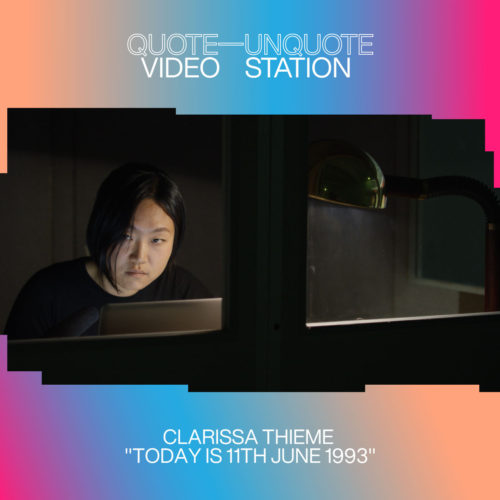
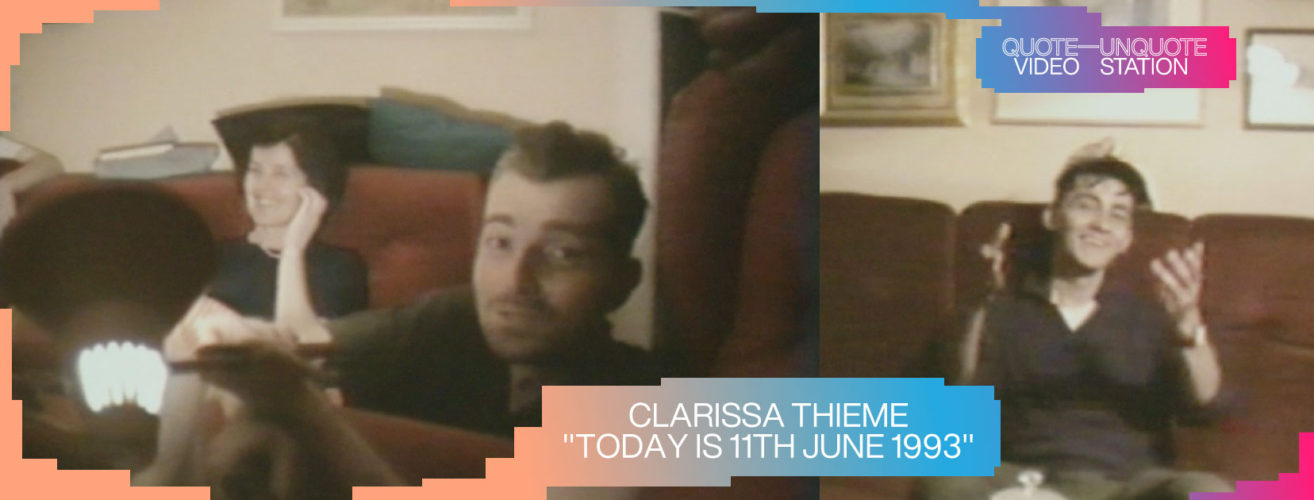
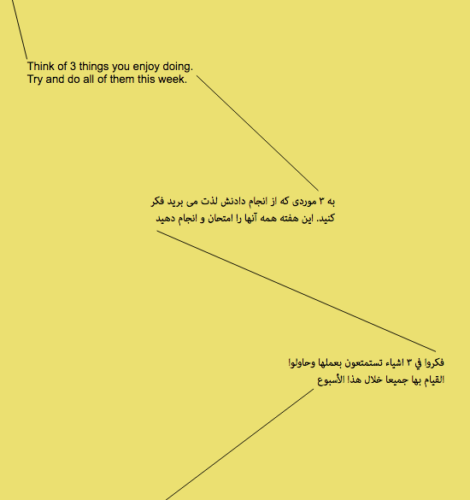
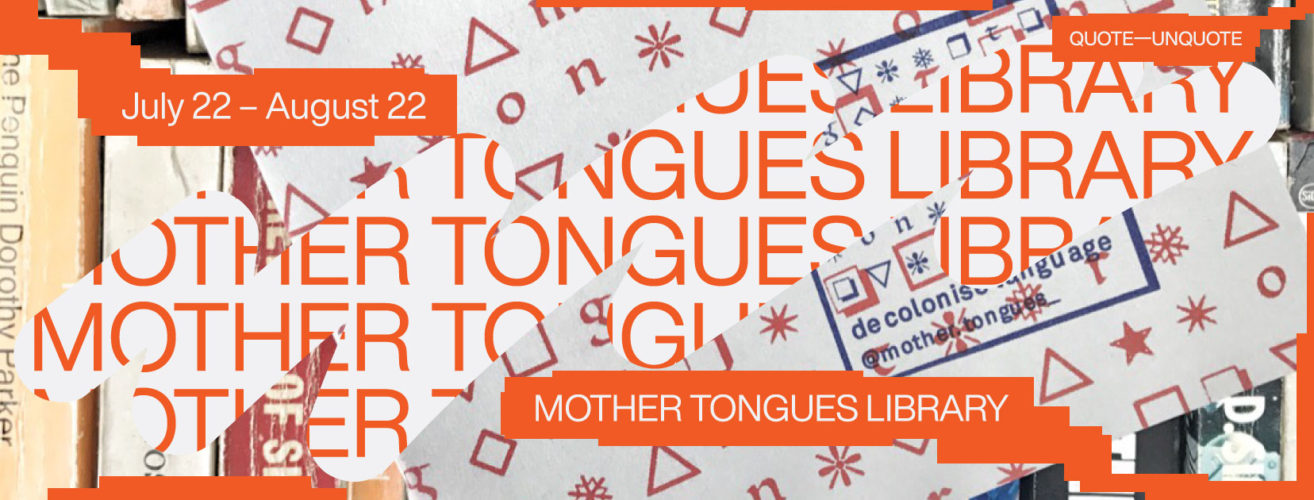
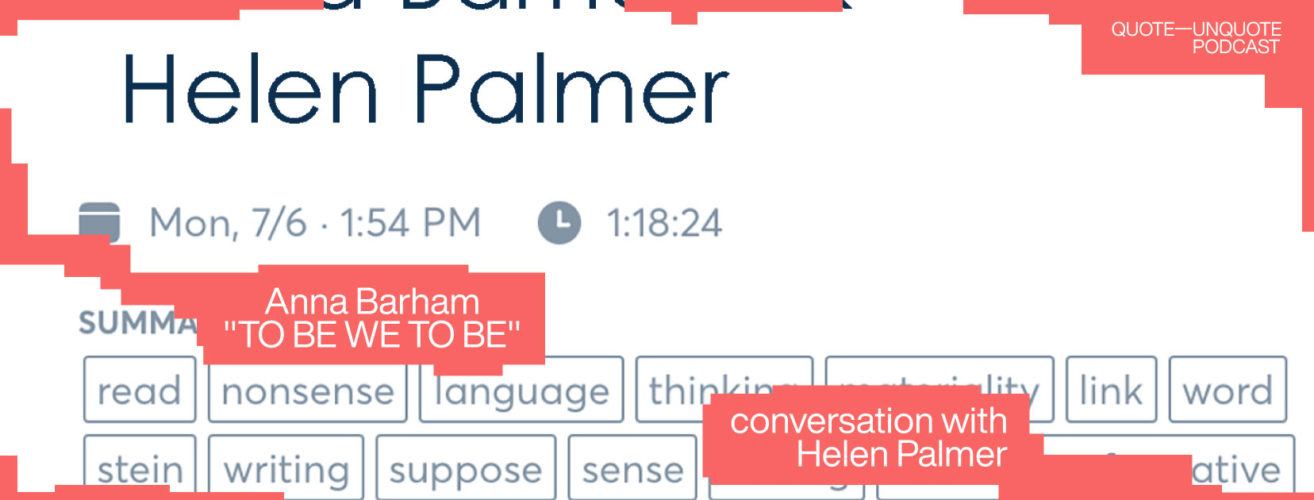
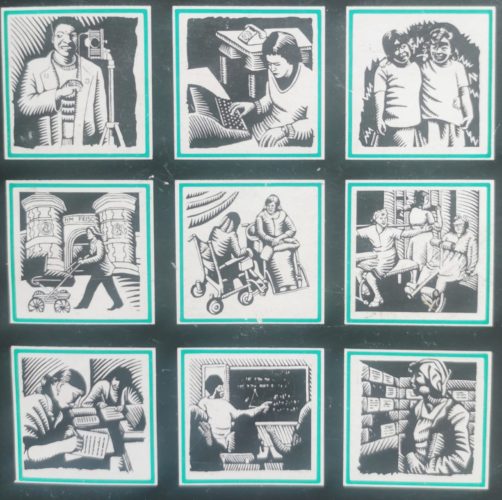
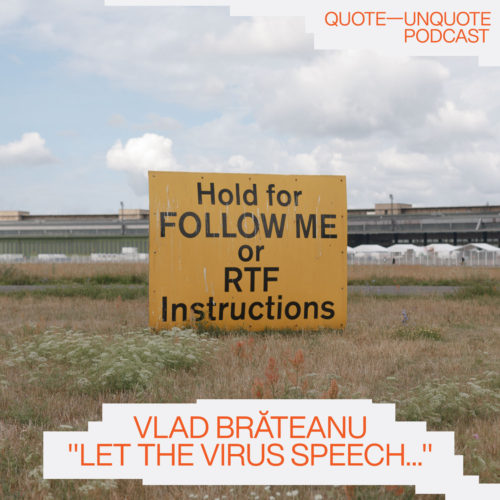
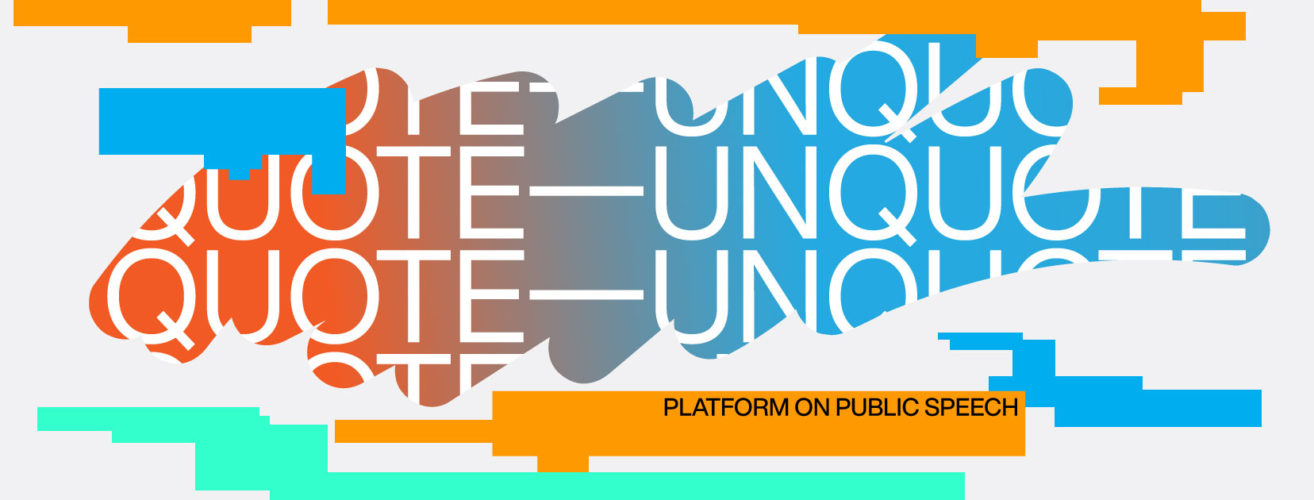
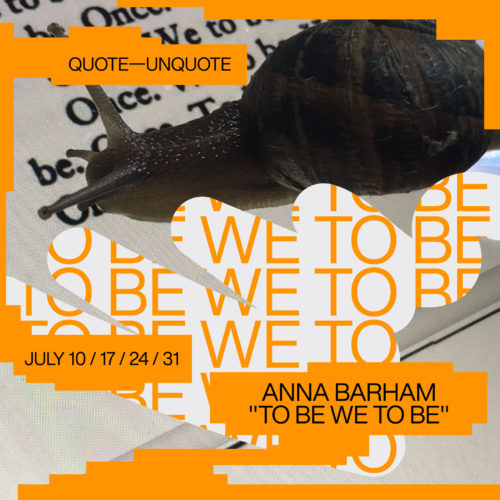
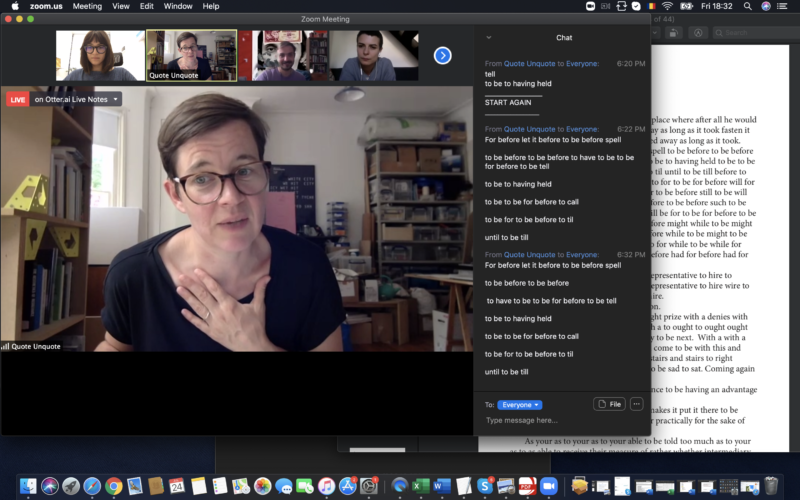
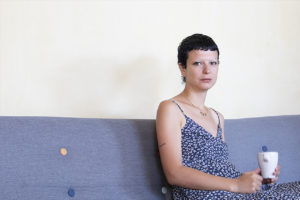
Comments are closed here.